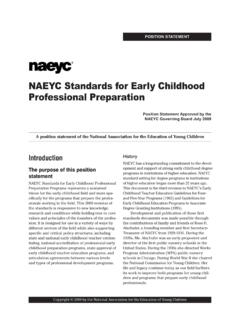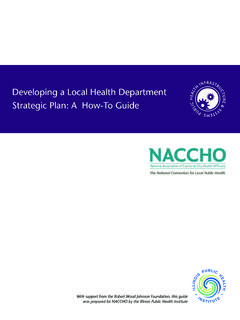Transcription of Ten Statements on Leadership - Mercuri Urval
1 Ten Statements on Leadership As part of our Tomorrow s Executive series of articles we bring you: an insight into what defines good leadershipBy Henning Meldgaard Nielsen; John MacFarlane; Richard Moore, Mercuri Urval Global Client ServicesGlendower: I can call spirits from the vasty deep. Hotspur: Why, so can I, or so can any man; But will they come, when you do call for them? from Shakespeare s King Henry IV part is one of the most important topics in the human sciences. It has been studied since Plato wrote about its importance, its determinants and its outcomes. Although some authors have lamented that Leadership is poorly understood, today there is a growing body of knowledge on the following ten Statements show how Mercuri Urval defines, conceptualises and understands Leadership .
2 We do not pretend to know all the answers to questions about Leadership . But we do have clear convictions based on our extensive experi-ence and good Leadership , employee well-being and performance are enhanced, and consequently, organisations thrive and prosper. Research has proven time and again that Leadership is a critical determi-nant of organisational effectiveness, as the following facts indicate: A recent study shows that CEO turn-over affects a firm s performance (Khurana & Nohria, 2000) Performance is approximately 20% higher and satisfaction 50% higher for subordinates who enjoy better quality relationships with their supervisors, ac-cording to one study (Uhl-Bien, 2003)
3 In a comprehensive study of 732 manu-facturing firms in the US, UK, France and Germany management practices are significantly associated with higher productivity, profitability, Tobin s Q*, sales growth and firm-survival rates (Bloom & Van Reenen, 2007)Furthermore studies on management de-railment show that 65 75% of employees in any given organisation report that the worst aspect of their job is their immediate boss. This causes employee engagement and performance to deteriorate (Hogan & Kaiser, 2005). In spite of the fact that we live in a knowl-edge economy, there is nonetheless a mis-match between what science knows and what business should still look carefully at whether they invest enough, in the right way, in building there current and future Leadership Statements on Leadership1.
4 Leadership matters* The ratio between a businesses market value and the replacement value of its book equity (assets).In line with this results-based approach, Leadership does not primarily concern indi-viduals, called leaders. Rather Leadership is primarily concerned with the performance of the collective for which the leader is re-sponsible. So an evaluation of Leadership effective-ness should focus on the performance of the group or organisation and the leaders contribution to that performance, not sim-ply as is often the case on leader emer-gence or how the individual leader is re-garded (Drucker, 2000; Kaiser et al, 2008).
5 This distinction is important because the factors associated with leading a success-ful team or organisation are not necessarily the same as those associated with having a successful career in management. How a team performs and how its leaders are perceived are two different things (Kaiser et al., 2008). One study claims that measures of team performance and measures of career suc-cess are unrelated. Less than 10% of a Ten Statements on LeadershipThere are many definitions of Leadership , and no single definition is right. Therefore one has to choose which definition to use.
6 We believe a results-based defini-tion of Leadership is the best. This means that the essence of Leadership is building and maintaining a team, and guiding that team towards desired results. Leadership is about achieving desired results (Hogan & Kaiser, 2005; Ulrich et al., 1999). Or as Ridderstr le & Wilcox note: Deliver excep-tional output or you become an output (Ridderstr le & Wilcox, 2008).Dave Ulrich has made a strong case for the need to align desired results with strategy, and to balance them across the key stakeholders (employees, organisa-tion, customers and owners).
7 To achieve results, leaders must create value in each of these areas. Serving only employees, for example, yields engaged employees, but organisations that fail to serve customers or to meet investor goals will not be suc-cessful (Ulrich et al., 1999).Overall this value creation can be seen in four areas: forming strategy, implementing strategy, managing operations and stake-holder Leadership . In each of these areas Leadership must deliver results in order to be Leadership is defined by results3. Leadership effectiveness should focus on group performancesample of general managers had both effective teams and successful careers (Luthans, 1998)1.
8 In an ideal world career success and Leadership capability would go hand in hand. However, we live in the real world. Leadership implies a following. If there are no followers, there are no leaders and vice versa (Locke, 2003). Leaders have to get other people to follow them. Remember Hotspur s question: Will they come, when you do call for them? Leadership is a relationship-based con-cept. Leaders act with followers rather than on them. Today, work gets done in an environment where an increasing number of employees have to be managed as if they were volunteers.
9 As Peter Drucker has said; They are paid to be sure. But knowl-edge workers have mobility. They can One does not manage people. The task is to lead people (Drucker, 1999). Ten Statements on Leadership4. Leadership is a collective phenomenon1 Successful managers spent their time differently than did effective managers. Career success was associated with socialising, politicking and networking. Effective team Leadership was associated with communicating, mo-tivating, conflict solving (Luthans, 1988). Kaiser et al. identify two categories of Leadership measures, each with two subcategories.
10 The first category focuses on individual leaders: a) emergence ( standing out in a crowd ) and b) perceived effectiveness ( approval ). The second focuses on the effects leaders have on the performance of the team: a) process ( how did the team play? ) and b) outcomes ( did the team win or lose ?) (Kaiser et al. 2008).In line with what has been labelled the New Leadership (Bryman, 1992), to demon-strate Leadership behaviour is to: decide what needs to be done; create networks of people and relationships that can ac-complish an agenda; and ensure that those people actually do the job (Kotter, 2001).










